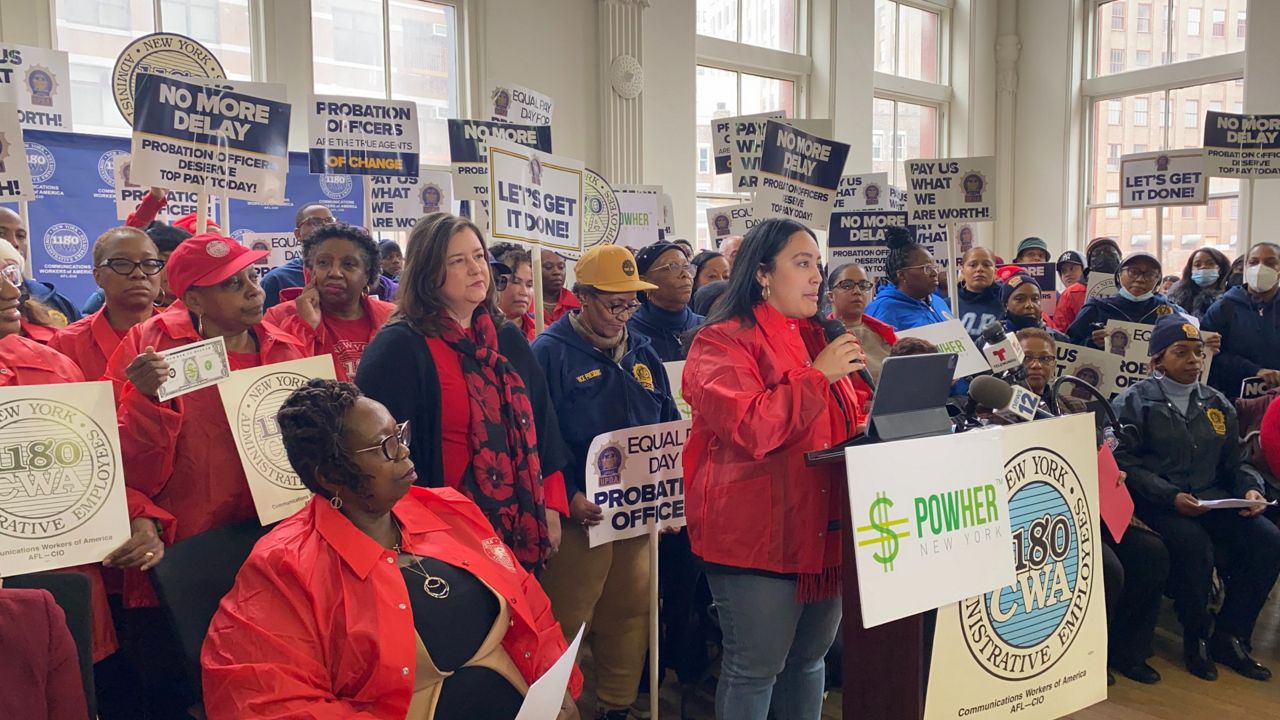Elected officials and women’s rights and labor advocates gathered in Lower Manhattan Tuesday to rally around the issue of equal pay.
March 14 is the symbolic date showing how far into the year women in the U.S. have to work to earn the same amount as men from the previous year.
In New York state, women earned 88.2 cents for every dollar that a man made in 2021, according to a new state report. For women of color, that number decreases — Black women earned 67.8 cents, and Latina women earned 62.9 cents, for every dollar that a white, non-Hispanic man earned.
“New York City would not be the city it is without the care and labor women have and continue to provide, so it is critical that women legislators like myself stand together with our partners in labor and advocacy to fight against this narrative that women’s work is not worth equal pay,” Councilmember Amanda Farías, co-chair of the women’s caucus, said Tuesday.
Last month, the City Council passed a legislative package of bills addressing pay equity, including a bill strengthening the Pay Equity Law from 2019 by requiring the Department of Citywide Administrative Services to collect and provide additional employment and pay data to the council on a yearly basis.
“This is an accountability bill and this is an opportunity for the City Council to hold the administration accountable,” Councilmember Farah Louis, co-chair of the women’s caucus and sponsor of that bill, said.
The state report, issued by Gov. Kathy Hochul’s office Tuesday, indicated that in New York, the gender pay gap over the course of a 40-year career would amount to $350,360 in diminished lifetime earnings, with an even wider loss for women of color.
The report found that the pivot to remote learning and child care closures during the pandemic severely impacted access to child care, a longstanding factor contributing to unequal pay for working women.
Women’s participation in the labor force dropped from 59.3% to 58.9% from 2019 to 2021, while the unemployment rate nearly doubled from 4.2% to 8.2%, according to the report. The number of unemployed women in 2021 increased to more than 405,000, up from 207,000 in 2019.
The report noted that even a temporary exit from the workforce can have significant long-term financial implications. It also noted "long-standing gender inequities and social norms" that women "do the majority of child care and unpaid labor,” as well as the gender pay gap directly leading to more women leaving the workforce, since the person making less in a household tends to be the one to leave the workforce.
"Far too many women in the workforce are still being denied equal pay for equal work, and as New York's first woman governor, I am determined to make things right,” Hochul wrote in a statement. “My administration is fully committed to closing the gender wage gap, especially for the single mothers and women of color who are disproportionately affected, because better working conditions for women means a stronger, fairer economy for all."
Elected officials emphasized the city’s need to do more to move this issue forward, including filling the city’s job vacancies.
According to a city comptroller report released last week, municipal employee retention and recruitment continues to be a significant concern for the city, impacting overall effectiveness of services.
For instance, the Department of Social Services has a 20% vacancy rate and is meeting only 42% of its goals, and only 47% of its target goals improved over the past year, according to the report.
Since women often bear the brunt of domestic work, the lack of access to services such as housing vouchers from the Department of Housing Preservation and Development, or obtaining food stamps under the Human Resources Administration, directly impacts women’s ability to participate in the workforce.
“It's not only about filling the vacancy to fill the pocket of the people that can be in those positions, but also the economic inequities that are happening in our neighborhoods because people can't get the services they need met,” Farías said.
For the first time in the city’s history, a majority of City Council seats are held by women, and officials pointed to that as one of the reasons the package of bills passed last month. They also emphasized that more work needs to be done.
“We continue to convene here every year to commemorate Equal Pay Day,” City Council Speaker Adrienne Adams said. “We still are not making a dollar, ladies, there's something very, very wrong with that.”



